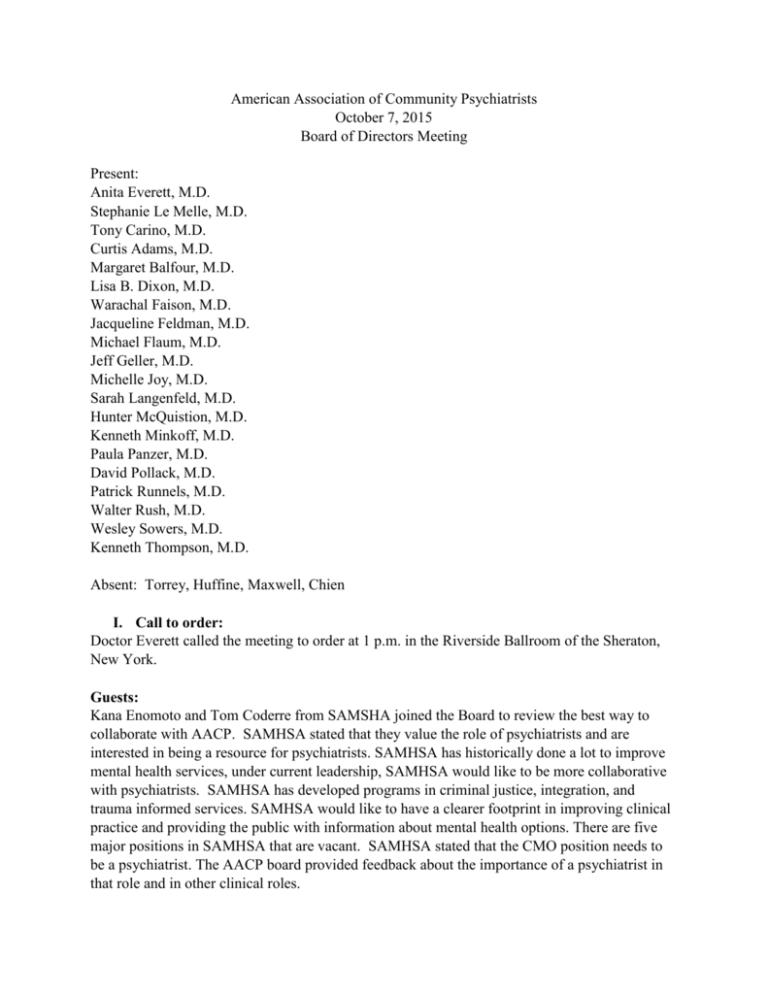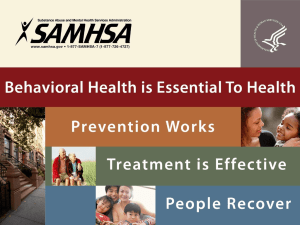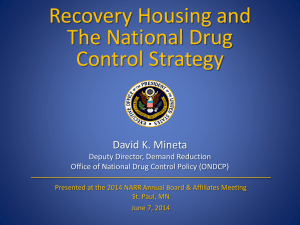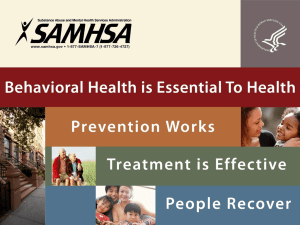Board Meeting Minutes, Fall, 2015
advertisement

American Association of Community Psychiatrists October 7, 2015 Board of Directors Meeting Present: Anita Everett, M.D. Stephanie Le Melle, M.D. Tony Carino, M.D. Curtis Adams, M.D. Margaret Balfour, M.D. Lisa B. Dixon, M.D. Warachal Faison, M.D. Jacqueline Feldman, M.D. Michael Flaum, M.D. Jeff Geller, M.D. Michelle Joy, M.D. Sarah Langenfeld, M.D. Hunter McQuistion, M.D. Kenneth Minkoff, M.D. Paula Panzer, M.D. David Pollack, M.D. Patrick Runnels, M.D. Walter Rush, M.D. Wesley Sowers, M.D. Kenneth Thompson, M.D. Absent: Torrey, Huffine, Maxwell, Chien I. Call to order: Doctor Everett called the meeting to order at 1 p.m. in the Riverside Ballroom of the Sheraton, New York. Guests: Kana Enomoto and Tom Coderre from SAMSHA joined the Board to review the best way to collaborate with AACP. SAMHSA stated that they value the role of psychiatrists and are interested in being a resource for psychiatrists. SAMHSA has historically done a lot to improve mental health services, under current leadership, SAMHSA would like to be more collaborative with psychiatrists. SAMHSA has developed programs in criminal justice, integration, and trauma informed services. SAMHSA would like to have a clearer footprint in improving clinical practice and providing the public with information about mental health options. There are five major positions in SAMHSA that are vacant. SAMHSA stated that the CMO position needs to be a psychiatrist. The AACP board provided feedback about the importance of a psychiatrist in that role and in other clinical roles. SAMHSA stated they would like to have a psychiatrist, ER physician, pediatrician, and addiction specialist, psychologist and a nurse. AACP again reiterated importance of hiring community psychiatrists for SAMHSA leadership roles. Currently, the roles of these positions are represented through the advisory council. Per SAMHSA, Pam Hyde, during her leadership, broke down many barriers. She was able to improve intra-organizational cooperation so that internal offices and departments began to communicate with one another. The role of the medical director was discussed along with clinical medical practice and how to implement this into the field of mental health. SAMHSA discussed its Clozapine REMS initiative as a way to work towards improving clinical, psychiatric care. SAMHSA discussed obtaining some clinical information from AACP members around some of the monitoring guideline changes. The board members expressed concern about the potential operational problems associated with Clozapine REMS-the specific concern that it may be more difficult for a provider to cover for another provider under the new system was discussed. SAMHSA leadership reported a plan to look into this and asked for feedback about clozapine REMS as the roll out occurs. AACP board agreed to provide feedback through meetings. Some questions that SAMHSA would like to be answered: What are some of the things that we would want states to do in terms of data collection to improve health? How do people access help? How do we get states to communicate? One of the things SAMHSA championed but it did not get picked up was changing social norms around mental health to address stigma. You need to make sure Congress knows the economics of mental health, leading causes of disability, mental health is still the biggest and most underfunded problem in the country. SAMHSA discussed a plan to use regional offices for future interventions. The regional offices are changing and there is more communication between the regional offices. There currently are regional offices in ten regions. AACP board members discussed the value of embedding psychiatrists into regional offices. This way, these psychiatrists could serve as a resource for SAMHSA and psychiatrists in their region to work for change. SAMHSA wants to be useful so if you will tell us who and how we might be helpful, that would be great. The next call scheduled for October 23 with SAMHSA. ACTION: Collaboration and coordinating with SAMHSA was identified as a followup action for Plank #2. II. Review of Minutes: The minutes were circulated for review. Motion: Doctor Carino moved to accept the minutes as circulated. Second: Doctor Le Melle seconded. Motion passed. III. Report from the Treasurer: The end of the year report was reviewed. There were some questions that needed to be answered and these will be referred to Doctor Maxwell. IV. Report from the Nominations Committee: Doctor McQuistion reported: Michael Flaum: President Curtis Adams: Vice President Edward Maxwell: Treasurer Secretary: Paula Panzer V. Winter 2016 Meeting: Doctor Santopietro will reported on the last winter meeting and discussed the potential for a future meeting. There is a possibility that the winter meeting could take place in Charlotte in February, but it cannot be confirmed for another month. It was recommended that we have a Plan B. Doctor Balfour will look into Arizona as a Plan B. The possibility of including recovery to practice training as part of the winter meeting agenda was raised. The question was raised if the Hogg Foundation could provide any support. VI. Recovery To Practice (“RTP”): Doctor Sowers reviewed the history of the RTP project. This was a five year plan supported by SAMHSA, APA and the AACP worked on this with APA to develop 9 modules for practice. The modules developed by AACP and APA were designed for physicians as audience. The modules support the process of changing clinical practice of clinicians towards more person centered and recovery oriented approaches. The board identified this as a valuable resource; however, there is no current funding for implementation of this training on a larger scale. The board discussed funding options: A request has been submitted to AACP Foundation for Excellence in Mental Health Care (“FEMHC”) fund to pay administrative costs of $1,000 to support implementation. The AACP FEMHC fund has enough resources to cover this cost; however, it would need to be replenished. Could some of the LOCUS income be designated for this project? Could the board donations for travel be used for this project? A restricted fund could be designated by the Board as a potential ongoing funding source. This is a long range project. The Board asked for a clearer definition for Phase Two of the RTP project. This project was identified as being part of the work in Plank #4. ACTION: The Board approved for $1,000 to cover administrative costs of implementation of RTP to an administrative trainee. The deliverables are 6 webinars focused on supporting treatment. There is one work group focused on phase one. The webinars have been approved by SAMHSA and it is more micro managed than the first phase. The right strategy is to disseminate this material and how to get paid for the product. ACTION: Referred to Plank #4 Plank Reports: Policy and Framework: Goals established for revision of AACP vision and mission statements. New mission and vision statements were approved. Goals to meet mission and vision were discussed. This Plank is looking at the present strategic plan and what needs to be modified. Preliminary work has begun on goal 2. This Plank will take on branding and AACP collaboration with APA. Embrace the strategic plan, get the new mission statement and vision state on the website, newsletter, bylaws and membership brochure Members: Feldman, Panzer, Thompson, Pollack, Bennington-Davis, Joy, & Geller. Customers and partners: The objective was to connect to our members, board, and external stake-holders. The short term goal was to get the board updated with their profiles The website was reviewed and a change will be made to the site and maintenance of the site. The cost will be $1800 a year with CitiSoft. A contract has been signed. In the interim, Doctor Adams has been modifying the existing site. We will continue to have a presence in social media through tweeting and maintaining a presence on Facebook. Currently, the AACP has 360 likes on Facebook and 504 twitter followers. The textbook is there, LOCUS is on the home page, and AACP webinars are under news and events. The relationship with SAMHSA is a priority linkage. The position papers on the website are out of date. A process needs to be developed to review, revise, or retire these documents. A discussion of the content on the new website occurred. The board discussed the need to determine if the old position papers would be on the website or archived. Some of these papers might not need much revision to be current. Availability to membership is important as members state that the papers are helpful resources. ACTION: A work group needs to be appointed and go through 5-7 papers and make a recommendation on these products. Each member could review 2 and make a recommendation. Members: Adams, CHien, LeMelle, Santopietro, & Rush. Internal operations: A goal is to improving the journal accessibility for our members. The minutes from meetings need to get out to membership promptly after each meeting. There is a value to inviting guests to Board Meetings. AACP plans to elicit feedback from members and to give it to SAMSHA Margie reported. Our role is to manage the work of the board and to use the planks to get work done. The agenda was revised and seems to be working. The minutes were sent out more quickly after the last meeting. Doctor Everett discussed that the organizational structure of the meeting and agenda was changed and asked for feedback about how the meeting is running. This plank identified a list of priorities for community psychiatrists to be provided to SAMHSA. The plank discussed ways in which membership can be engaged in this process. The Plank dis cussed the optimal way to communicate to SAMHSA about these priorities.We may try a multi voting approach to get the group to come to a consensus and we want to engage the membership to get other ideas. We will find a way to find this survey approach on line so we can send out to the membership. A procedure will be circulated with a policy to get material quickly to the membership Members: Balfour, Everett, Maxwell, Carino, & Bell. Products and services: Website, RTP, journal, & Certification Although the initial wave of examinees has resulted in certification, there has been a delay in providing access to the second wave of examinees due to needing to identify a secure and reliable testing platform. The goal of this group was to have the certification go live in the Spring and on a platform that is stable. Potential exam platform options were reviewed. RTP: The request was received to pay an administrative trainee $1,000. Motion: Doctor Runnels moved to pay this from general funds. Second: Doctor Feldman Motion passed. Members: Runnels, Minkoff, Flaum, Sowers The group discussed how to get RTP out. The group will work on a document to circulate to the membership and increase member awareness. An article will be written for the newsletter, posted on Facebook and Twitter. Five residency directors and five state MH directors will be identified to move this forward. A recommendation was made to have the Board do a one-day training to become a trainer for RTP at a future meeting. This would give us geographic diversity. Meeting adjourned at 7:15 p.m. October 8, 2015 Present: Anita Everett Stephanie Le Melle Curtis Adams Margaret Balfour Jeffrey Geller Steve Goldfinger Hunter McQuistion Kenneth Minkoff Paula Panzer Jules Ranz Walter Rush John Santopietro Wes Sowers Meeting called to order at 8:30 a.m. VII. Liaison Reports: a. APA: the Scientific Program Committee will be looking for new members and AACP will be asked to nominate members. Doctor Santopietro is interested in serving on the committee. b. NY Chapter AACP: this chapter represents New York, New Jersey and Connecticut and is a joint chapter with the American Association of Psychiatric Administrators. The conference was well attended. There is a criminal justice initiative for behavioral health. c. PsychSign: there is a meeting this week and we are speaking to them. d. AACAP: Mary Gabriel is the liaison. e. AADPRT: Doctor Goldfinger recommends that AACP begin presenting at the AADPRT Annual Meeting. Doctors Goldfinger and Sowers will present at the AADPRT meeting. f. Springer: Doctor Feldman met with Springer representatives and reviewed the statistics of publishing and rates of publication. The material is increasing accessed through google. Guest: Larry Miller, M.D. joined the meeting to review a position statement: State Mental Health Authorities: Care of Persons with Persistent or Recurrent Major Mental Illness. ACTION: Doctor Everett will work with Doctor Miller to provide background to this position statement. Guest: Maria Oquendo, M.D. joined the meeting. Doctor Oquendo joined the group. The AACP is interested in nominating members to the scientific program committee(“SPC”) for the IPS Meeting. Doctor Oquendo expressed her interest in appointing younger members. The issue of work force development and retention was discussed. There are four slots on the SPC, and the AACP will submit names. (Chien, Joy, Lluberes, Santopietro, Langenfeld, Dixon and Mangurian) VIII. Old Business: The issue of reviewing the policy to review documents on the website was revisited. The review process would be led by the internal operations plank and the executive committee. No specific consensus was reached at this time. Meeting adjourned at 12 noon






